There is a myth among the SEO industry that government websites are protected by search engines and will rank #1 no matter what, however, this is actually untrue: .gov websites must follow the same rules as any other website as dictated by the search engine’s algorithm. As a result, we believe government websites need to consider SEO – and we’re going to show you why.
We often think that .gov domains are somehow different, when in reality, the only difference between a .gov and domains like .com, .co.uk or .org is that you can’t easily buy them. For example, in the UK, you have to prove that you belong to a governmental organisaftion in order to register a website with a .gov.uk top level domain. As a result, search engines are more likely to trust them and give them an authoritative bonus, as these websites have a duty to deliver relevant information – they can’t do spam!
A consequence of this trust is that search engines will usually rank .gov domains on the first page for relevant queries. This is the reason why people say they are protected or untouchable, but in essence, they can be unranked: you just have to show to the algorithm that your content is more valuable. This is becoming increasingly possible with Google as they’re rolling out the so-called “answer box” on almost all informational queries.
If you still don’t believe that a none .gov website can out-rank a .gov website, here are some examples:
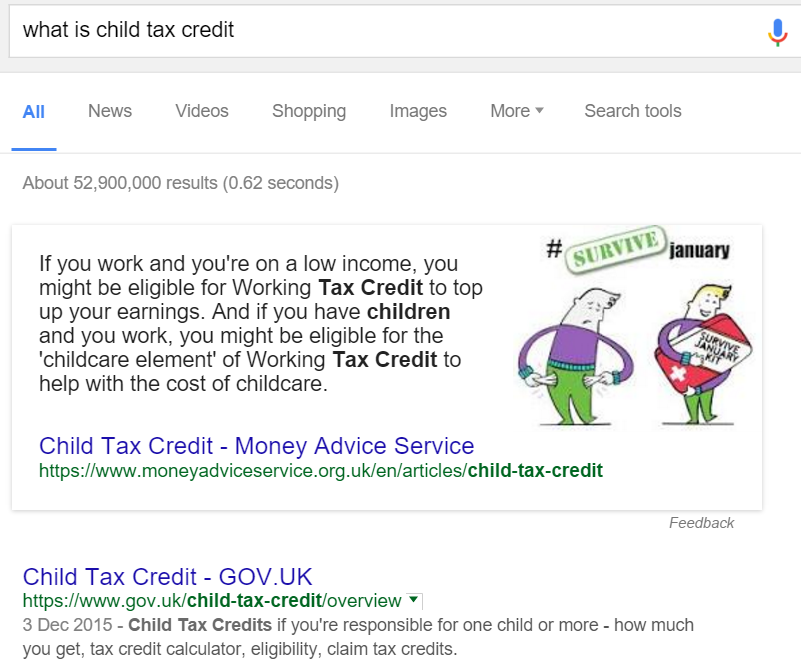
In this example, a .org.uk website appears in the answer box above the official child tax credit website – for the query “what is child tax credit” (1,300 AMS).
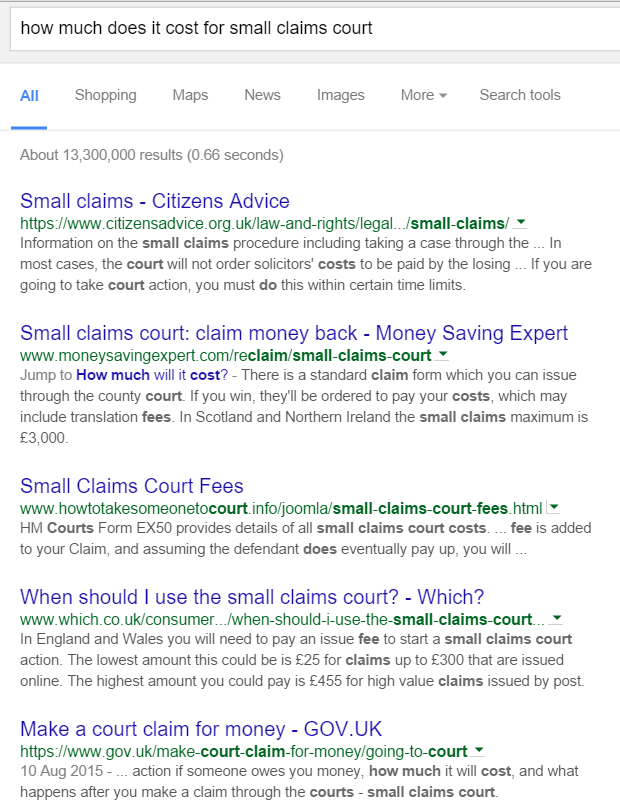
For the query “how much does it cost for small claims court” (30 AMS), there are 4 websites ranking above the official government website.
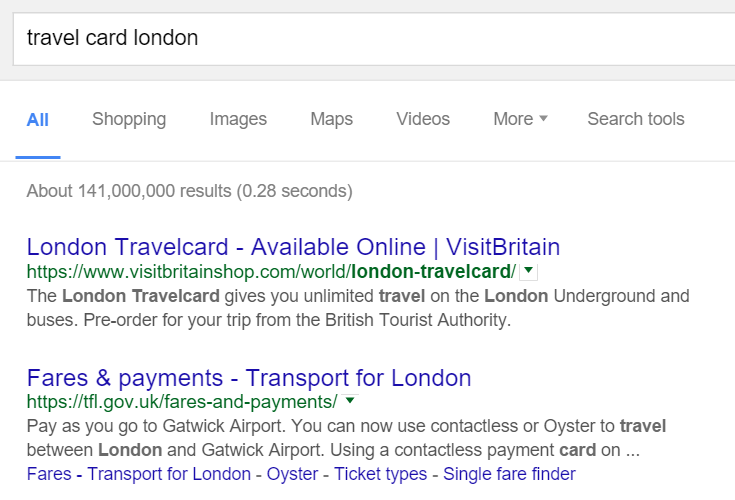
For the query “travel card London” (3,600 AMS), a .com website is ranking above the official Transport for London website, tfl.gov.uk. You may also notice that the tfl.gov.uk doesn’t seem to have any information about the travel card!
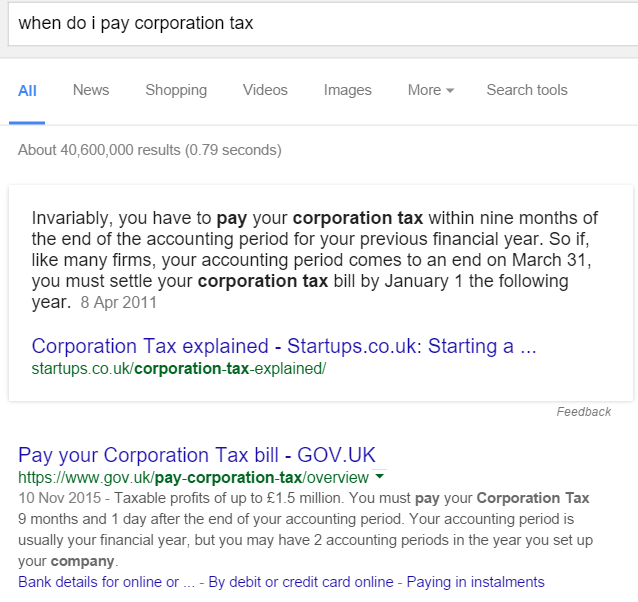
Finally, this example shows a .co.uk website with its content in the answer box for the search query “when do I pay corporation tax” (70 AMS) – ranking above the government website.
This is great for the websites in question, but not always the user: the information delivered by a non-governmental website may not be accurate, can be outdated, or worse: be deliberately misleading. Users might make a decision based on false or wrong information which could have unfortunate consequences.
A French case study
In France, governmental websites use the top level domain “.gouv.fr” and any website using this domain is strictly regulated. However, even though governments – in France or elsewhere – have communication teams that are, most of the time, good at relaying messages to the right audience, it seems that, in many cases, internet search is always the last resource considered – or even completely ignored. This recently happened in France, when the government launched a new marketing campaign around the sensitive subject matter of abortion.
Background
In September 2015, the French Health Minister launched a national marketing campaign to raise awareness about abortion, with adverts being seen all over various media and public transport. The message was simple and tattooed on the shoulder of a young lady named Chloe: “Abortion is my right. Abortion: My body, my choice, my right”. A brand new website was also launched: www.ivg.gouv.fr.

However, things didn’t quite go to plan: in January, internet users searching for “IVG” – that’s “interruption volontaire de grossesse”, or abortion in English – were given, as a top search result, an anti-abortion website.
Users complained that the pro-life website “tricked” them into clicking on their entry by advertising under false pretences. When browsing the website, it actually takes a while to understand that it is an anti-abortion website, as it pretends to be neutral and informative, hiding its ulterior motive to discourage women from having an abortion.
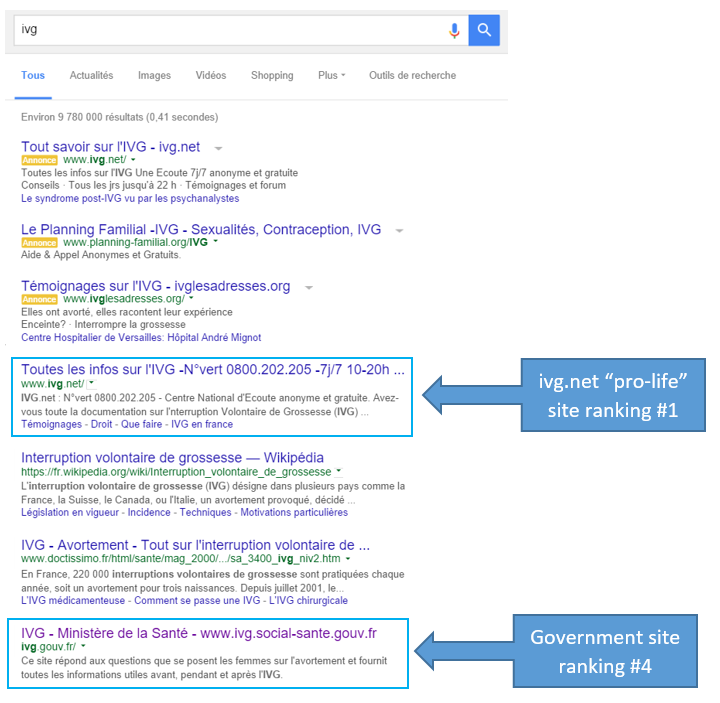
Google has a monopoly on search in France, accounting for 93% of all organic searches. Additionally, the keyword “IVG” has an average of 27,000 monthly searches in Google. Google is, therefore, the main point of call for anyone searching online about abortion.
To counteract the effect of the anti-abortion website and put the official government website back in position #1, various media outlets, and even the French Health Minister urged people to “click” on the official website in the SERPs. However, as all SEO professional know, this was never going to work!

“Thanks to everyone helping us get the official website ranking at #1 again. To help a notch, just click on IVG.gouv.fr” – Marisol Touraine, French Health Minister.
What went wrong?
In the aftermath of this incident, SEO has been a hot topic in France and suddenly people are paying attention to what is happening in the SERPs.
Many SEO experts have been invited to various media outlets and try to explain what SEO is and how it works. One of them was Olivier Andrieu (@abondance_com) who explained, on the national radio station France Inter, why the Government website was not ranking. He gave three simple facts:
- Technical issues
- A lack of links
- Quality of content
To expand upon these points, we’ve carried out our own mini SEO audit of the government’s website, which you can read below.
Technical issues
1. Lack of crawlability
The website is advertised as www.ivg.gouv.fr, however, this goes through several redirection loops and even worse: there is a 302 redirection in the middle!
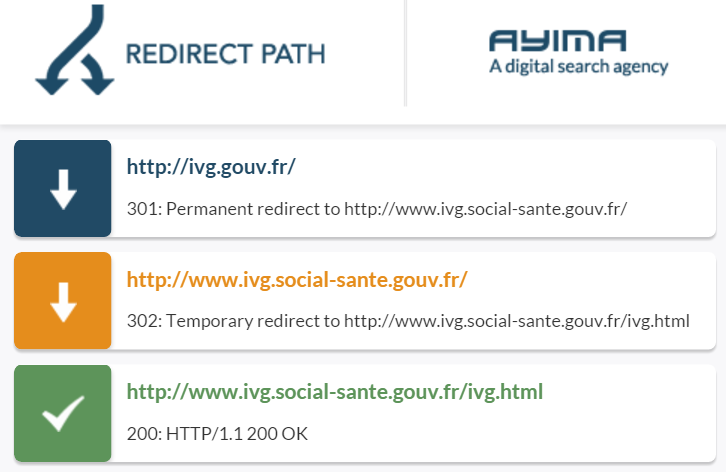
This will have a negative effect on crawlability and is creating unnecessary duplicates:
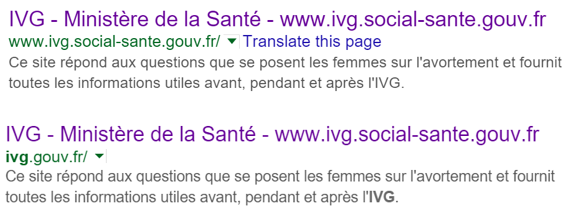
Because of these crawlability issues, the website is not indexed properly:
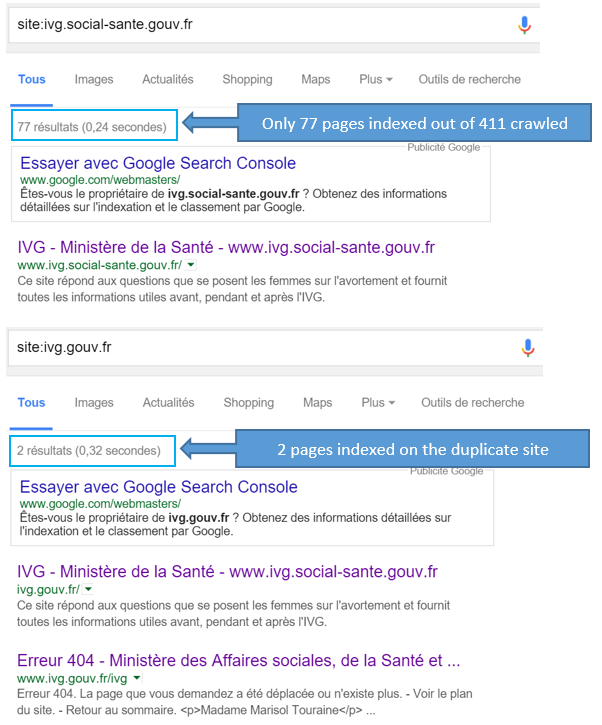
Using Screaming Frog, we found 411 pages with a 200 live status! It’s not a big website but the potential is real, especially when compared to its rival:
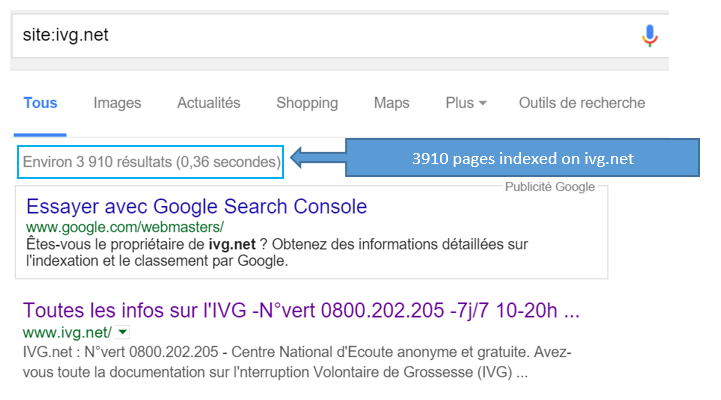
2. Meta data
When your website appears in the top 3 results, the last thing you want is to waste the great opportunity to attract more visitors. Make the most of this advertising space and deliver a key message complete with calls to action. This will improve your click through rate, and if users land on a page where they engage (spend time on, browse pages, watch videos, download documents), the website might benefit from a small ranking boost. Unfortunately, this is exactly what the government website doesn’t do!
The title is poor and doesn’t really make users want to click on it:
IVG – Ministère de la Santé – www.ivg.social-sante.gouv.fr
The keyword is there but why would you add a website address? Remember: the marketing campaign was advertising www.ivg.gouv.fr, so this is confusing. Additionally, the only trust-building element is the mention of the Health Department, “Ministère de la Santé”.
This looks increasingly poor when compared to the other website:
Toutes les infos sur l’IVG -N°vert 0800.202.205 -7j/7 10-20h
Which translates as “all you need to know about abortion – free phone number 0800.202.205 – 7 days a week from 10 am to 8 pm”. That’s it: as a user, this is all we need to know!
On top of that, the meta description is slightly better:
Ce site répond aux questions que se posent les femmes sur l’avortement et fournit toutes les informations utiles avant, pendant et après l’IVG.
“This site answers any questions women may have about abortion with useful information, before, during and after going through it.”
The only problem here is that there is no call to action telling users why it’s worth paying a visit to the website!
Compared to the other website:
IVG.net : N°vert 0800.202.205 – Centre National d’Ecoute anonyme et gratuite. Avez-vous toute la documentation sur l’nterruption Volontaire de Grossesse (IVG)
“IVG.net: free phone number: 0800.202.205 – National Listening Centre for abortion, anonymous and free. Do you have all the documentation about abortion? (IVG)”
Here, the full length of this advertising space is used to maximise user click through rates. It achieves this by featuring a strong call to action, good branding, a unique selling point, the free phone number and even targeting a question to the user. You can’t miss it – it’s in your face!
Lack of links
This is definitely the main culprit: with a pathetic 78 unique domains linking to www.ivg.social-sante.gouv.fr (according to aHrefs) the website has no chance of ranking against the competition. Also, the authority which could be passed on from www.ivg.gouv.fr is blocked behind the 302 redirections! That domain has almost 200 unique referring domains now.
It would be fair to assume that the competition is laughing, however, it seems that just by changing a few things the government website could be easily ranking above the anti-abortion website.
Additionally, hardly any links from other government websites point to ivg.gouv.fr or ivg.social-sante.gouv.fr – a real shame when we know the power of these links on SEO!
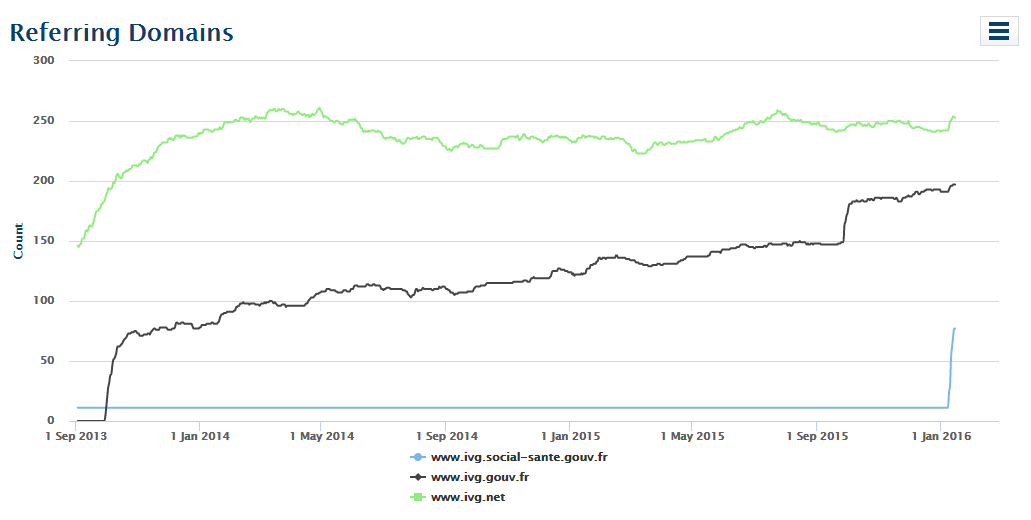
Quality of content
This is where user experience (UX) can make a real difference. We found that the pro-life website not only uses better imagery but also uses subtle ways of encouraging users to engage with the website.
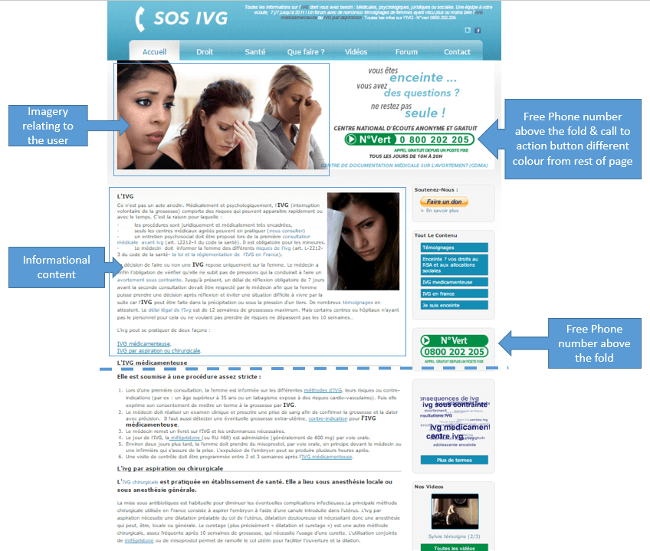
The government website is not on point and doesn’t answer the main question – how and where can I get information about abortion? – straight away. On the homepage, you need to scroll below the fold to find any answers to the questions a user might have.
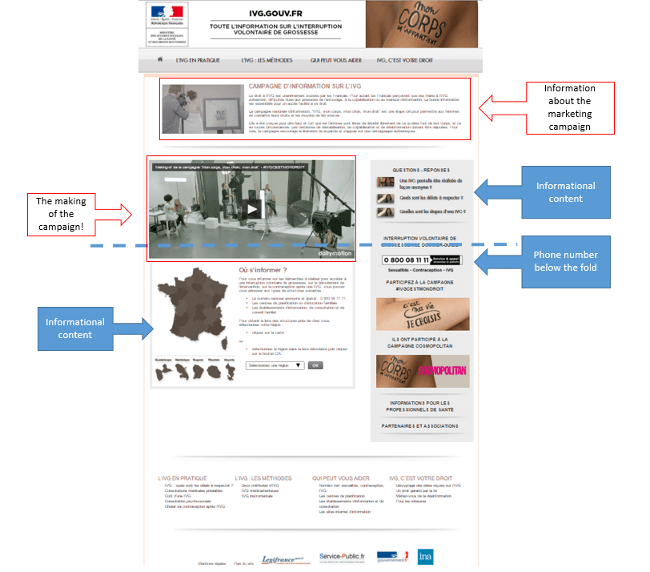
And finally: the government website isn’t even mobile friendly!
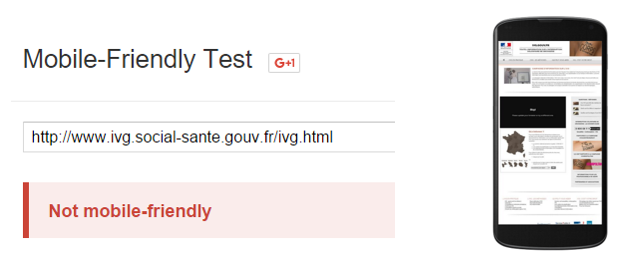
Whilst the pro-life website is:
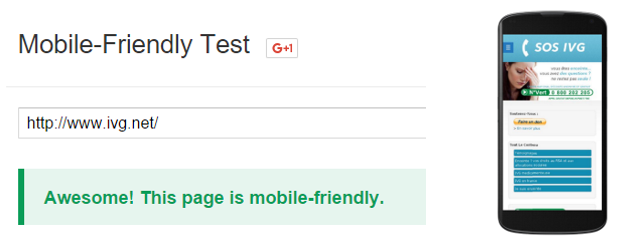
Unfortunately, this means that the government website will not rank in the mobile SERPs, leaving the competition to own that space.
Final words
As this example shows, it wouldn’t take a great deal of work for the government website to rank organically – and it’s a shame that all the necessary precautions weren’t taken before website launch. Ironically, in order to rectify the issue, the Health Minister is now spending money on PPC:
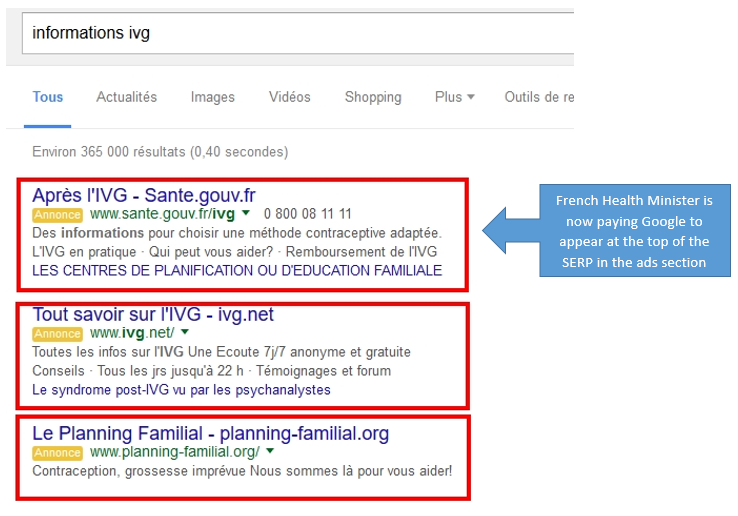
This case study clearly shows that governmental websites definitely need SEO. These websites are meant to be neutral, reliable and informative, but that doesn’t mean that they are doing what it takes to be noticed by search engines.
Disclaimer: none of the sites in this case study have had an active link added to them from this site in order to remain neutral in this argument happening in a foreign country.
Sources
UK Sources
- SEO for .gov.uk: https://gds.blog.gov.uk/2012/10/03/seo-for-gov-uk/
- Report a misleading website to Search Engines: https://gds.blog.gov.uk/2014/03/02/report-a-misleading-website-to-search-engines/
- The SEO War: fighting the good fight in search https://gds.blog.gov.uk/2012/07/10/the-seo-war-fighting-the-good-fight-in-search/
French Case Study sources (in French):
Various media outlet reporting the case and putting SEO in the spotlights:
- L’Express: https://www.lexpress.fr/actualite/societe/sante/ivg-la-guerre-sur-google-est-a-nouveau-declaree_1751387.html
- Libération: https://www.liberation.fr/futurs/2016/01/08/comment-lutter-contre-les-sites-anti-ivg-sur-google_1425070/
- 20 Minutes: https://www.20minutes.fr/sante/1763623-20160111-ivg-gouvernement-lutte-net-contre-sites-anti-avortement
- FranceInter (Radio): https://www.radiofrance.fr/franceinter/podcasts/la-tete-au-carre/le-plaisir-feminin-7144584 This is the interview with Olivier Andrieu (@abondance_com) – from 3’07” to 11’45”


